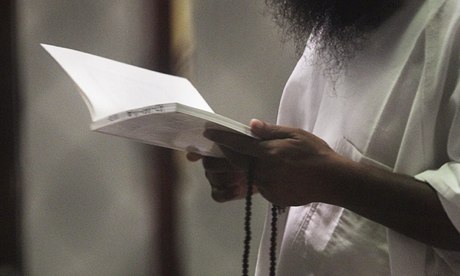
I guess it's funny. Funny the US government is so keen to look after Shaker Aamer's wellbeing that despite judging him one of the "most dangerous, best-trained, vicious killers on the face of the earth", they're worried he won't be able to handle a bit of swearing. At least, according to Aamer, that's the reason censors have stopped him reading the second volume of Russell Brand's memoirs, Booky Wook 2.
Writing in the New Statesman he explains that almost 12 years into his detention without charge at the prison camp in Guantánamo Bay, he's been trying to work out what gets the camp's censors hot under the collar. His lawyer, Clive Stafford Smith, drops off a few books every three months or so, but it's still "difficult to identify any consistent or logical basis for the censorship". Nineteen Eighty-Four is apparently fine. Gulag Archipelago is not.
On his most recent visit in October, Clive gave me a list of the titles he had dropped off for me, so I could let him know later what had been banned by what I prefer to call the Guantánamo Ministry of Information. One was Booky Wook Two by Russell Brand. I understand that Brand uses too many rude words. I suppose you have to be amused by that: the US military is solicitous of my sensitive nature, and wants to protect me from swearing. These are the same people who say that all of us at Guantanamo are dedicated terrorists.
I suppose it's funny that while David Copperfield is a hit with prisoners, Tom Bingham's The Rule of Law didn't make it through – Aamer quips that the former law lord's book would clearly be "inconsistent" with the values of a detention camp where the rule of law is suspended. Maybe it's amusing that Alan Dershowitz's Blasphemy: How the Religious Right is Hijacking Our Declaration of Independence was hijacked, or that Fyodor Dostoevsky's Crime and Punishment found itself under lock and key.
But almost four years after Barack Obama signed an executive order to close the prison there are still 162 men locked up in Camp Delta without trial. Twenty nine of them are on hunger strike, with 19 of those – including Aamer – currently being force fed, so forgive me if I find it a little hard to see the funny side.
Way back in 2007 Mark Falkoff – the lawyer who put together a collection of inmates' poetry, Poems from Guantánamo – said that prisoners were "writing poetry because they need some kind of mental stimulation, some way of expressing their feelings, some outlet for their creativity". Five years later Aamer writes that when he is "allowed to read, for a short while it lifts the heavy gloom that hangs over me". It's 12 years since he saw his wife and children, the youngest of whom was born the day his father arrived in Guantánamo Bay. Twelve years of imprisonment without charge. If literature can help him face the prospect of another day in prison, the least I can do is send the guy a decent book. Let's see if it arrives.

